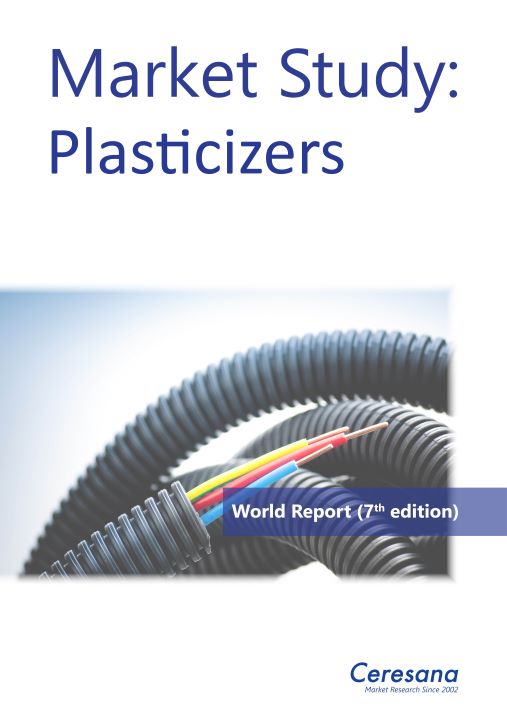The world is often hard and brittle, but plasticizers make life easier: Chemicals are added to plastics, elastomers, paints and coatings, adhesives, and also, for example, textiles, deodorants and perfumes to make these materials soft, pliable, stretchable or easier to process. These helpful additives are even among the best-selling chemicals of all: nearly 9 million tonnes are currently sold each year. Ceresana has already analyzed the global market for plasticizers for the seventh time: Market researchers expect demand for these indispensable additives to rise to a total of more than 11 million tonnes by 2032.
Plasticizers for flexible PVC
Asia-Pacific is by far the region with the highest sales of plasticizers. According to Ceresana’s forecast, this region of the world, which accounts for almost two-thirds of plasticizer consumption today, will continue to record above-average growth rates in the coming years. Demand for plasticizers is also growing by more than 2% pa in Africa and the Middle East, while it is hardly growing at all in Western Europe. Plasticizers are used primarily to make plastic products more pliable, soft and elastic. This application area alone currently requires almost 8 million tonnes per year. The inherently hard and brittle polyvinyl chloride in particular would often be useless without plasticizers: soft PVC consists of up to 50% of plasticizers. Plasticized PVC is processed, for example, into hoses, cables, seals, floor coverings and shoe soles. However, Ceresana expects the greatest growth in plasticizer demand to come from plastic films.
Increasing demand for alternatives to phthalates
If they are not firmly bound into other materials by copolymerization, plasticizers can evaporate from the end products, wash out or be dispersed by abrasion of plastic particles. Phthalates, which are considered harmful to health and the environment, are now banned for many applications. In Europe, for example, they are banned for children’s toys. Nevertheless, the most widely used type of plasticizer worldwide is still DEHP (bis(2-ethylhexyl) phthalate), with more than 3 million tonnes per year. The two phthalates DINP (diisononyl phthalate) and DIDP (diisodecyl phthalate) together still account for almost a third of the total plasticizer market. But more and more plastics processors are looking for more environmentally friendly alternatives: Ceresana analysts expect demand for phthalate-free plasticizers to increase to around 2.6 million tonnes.
Industry analysis and market data on plasticizers
Chapter 1 of Ceresana’s new study analyzes the global plasticizers market – providing forecasts up to 2032. Demand and revenues are outlined for each region of the world, demand is also broken down for product types and application areas. The following plasticizer types are considered in detail: DEHP, DINP and DIDP, other phthalates, plasticizers without phthalates. The market report examines the various areas of application for plasticizers: Profiles, films, cables, floorings, other plastics, elastomers, paints and coatings, adhesives. Chapter 2 provides figures on both demand and revenues for a total of 44 countries. In addition, a detailed analysis of demand by application area is provided for the individual countries. Chapter 3 provides useful company profiles of the most important plasticizer manufacturers, clearly arranged according to contact details, revenues, profit, product range, production sites and brief profile. Detailed profiles are provided by 67 manufacturers, for example Arkema S.A., BASF SE, Dow Inc., Eastman Chemical Company, Evonik Industries AG, Kao Corporation, Lanxess AG, LG Chem, Ltd., Mitsubishi Chemical Holdings Corporation, and Nan Ya Plastics Corp. Further information about the market study “Plasticizers” (7th edition): https://ceresana.com/en/produkt/plasticizers-market-report

About Ceresana
As one of the world’s leading market research institutes, Ceresana specializes in the chemicals, plastics, packaging, and industrial goods sectors. Special focus areas are bio-economy and automotive / mobility. Since 2002, companies have benefited from high-quality industry analyses and forecasts. Over 200 market studies provide more than 10,000 clients around the world with the knowledge base for sustainable success. More about Ceresana at www.ceresana.com
Ceresana
Mainaustrasse 34
78464 Konstanz
Germany
Press Contact: Martin Ebner, m.ebner@ceresana.com
